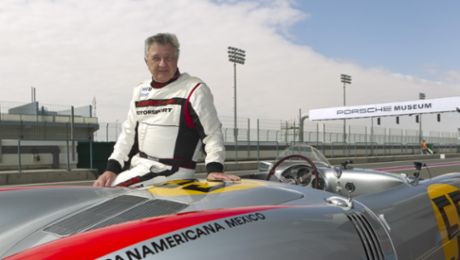Thomas Krickelberg studied mechanical engineering at RWTH Aachen University. As a student assistant at the Institute of Applied Thermodynamics, he gained his first experience in the development of sports car engines.
In 1990, he started working at Porsche in the Racing Engine Development and Engine Research department. Hans Mezger, who hired him, headed up the department and was the first person at Porsche to rate his abilities. The ‘patron saint of engines’ impressed Thomas Krickelberg not only with his knowledge, but also with the appreciation he showed to the engineers. It was unforgettable how he went from drawing board to drawing board in the Design department to discuss the latest state of development.
In 1992, the sports car manufacturer was facing its most serious crisis and had to reduce its headcount. Krickelberg moved to Advanced Engine Engineering at Ford-Werke AG, where he was employed in the field of direct injection, including a spell as Resident Engineer at Orbital Engine Company in Perth, Australia.
After his return to Porsche in 1996, Thomas Krickelberg worked in Engine Development as ‘Team Leader Engine Application’ and ‘Team Leader Basic Engine’ in the 996 project before moving to the 911 model line in 1999 as ‘Project Manager Drive’. He provided support for the Carrera model variants and the Turbo models, which were produced in parallel. In 2016, he assumed the management of the 911 model line. Since 2020, he has been responsible for production support, model updates and limited-edition models in the 911/718 model line as ‘Project Manager Operating Excellence’. During his time working on the model line, he also launched the construction of concept vehicles, as a result of which he was the project manager who was able to bring the limited-edition 911 Dakar into series production.
For Thomas Krickelberg, a 911 Turbo is a high-flyer whose recipe for success Porsche has not fundamentally changed in five decades. When he talks about the Turbo, conversation quickly turns to the development of the variable turbine geometry (VTG). Thomas Krickelberg was heavily involved in the project to give this technology its debut in a petrol engine. For the 2006 model year, Porsche presented an exhaust turbocharger of this nature featuring variable turbine geometry for the first time, which from its initial use in series production was then adopted for racing purposes. The 919 Hybrid used it as part of its exhaust gas energy recuperation concept and won the 24 Hours of Le Mans three times in a row from 2015 onwards.
CV
| 7 January 1963 | Born and raised in the Bad Godesberg district of Bonn |
| 1982 – 1989 | Studied mechanical engineering at RWTH Aachen University |
| 1990 – 1992 | Joined Porsche AG, Racing Engine Development and Engine Research department |
| 1993 – 1996 | Ford-Werke AG, Cologne, Advanced Engine Engineering department |
| 1996 – 1997 | Return to Porsche AG, Engine Development department |
| 1997 – 1999 | Team Leader Engine Application 911 and Team Leader Basic Engine 911 |
| 1999 – 2016 | Project Manager Drive, 911 model line |
| 2016 – 2020 | Director Model Line 911 |
| 2020 – 2023 | Project Manager 911 Dakar |
| since 2020 | Project Manager Operating Excellence, 911/718 model line |

